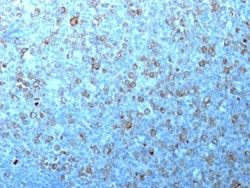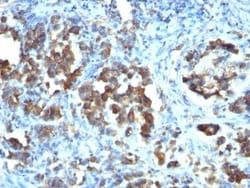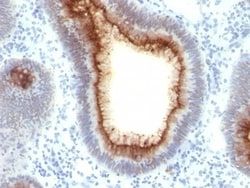CD4 Antibody (EDU-2), Novus Biologicals™
Mouse Monoclonal Antibody
Manufacturer: Fischer Scientific
The price for this product is unavailable. Please request a quote
Antigen
CD4
Concentration
0.2 mg/mL
Applications
Flow Cytometry, Immunofluorescence
Conjugate
Unconjugated
Host Species
Mouse
Research Discipline
Adaptive Immunity, Cell Biology, Cellular Markers, Cytokine Research, Immunology, Innate Immunity, Regulatory Immunology, Stem Cell Markers
Formulation
10mM PBS and 0.05% BSA with 0.05% Sodium Azide
Gene ID (Entrez)
920
Isotype
IgG2a κ
Purification Method
Protein A or G purified
Test Specificity
Recognizes a protein of 55kDa, identified as CD4. It is a membrane glycoprotein of T lymphocytes that interacts with major histocompatibility complex class II antigens and is also a receptor for the human immunodeficiency virus. This protein is expressed not only in T lymphocytes, but also in B cells, macrophages, and granulocytes. It is also expressed in specific regions of the brain. The protein functions to initiate or augment the early phase of T-cell activation, and may function as an important mediator of indirect neuronal damage in infectious and immune-mediated diseases of the central nervous system. Multiple alternatively spliced transcript variants encoding different isoforms have been identified. This MAb was characterized as human CD4 antibody at II and IV International Workshop on Human Leukocyte Differentiation Antigens.
Clone
EDU-2
Dilution
Flow Cytometry 0.5 - 1 ug/million cells in 0.1 ml, Immunofluorescence 0.5 - 1.0 ug/ml
Classification
Monoclonal
Form
Purified
Regulatory Status
RUO
Target Species
Human, Monkey, Orangutan
Gene Alias
CD4 antigen, CD4 antigen (p55), CD4 molecule, CD4 receptor, CD4mut, T-cell surface antigen T4/Leu-3, T-cell surface glycoprotein CD4
Immunogen
Stimulated human leukocytes
Primary or Secondary
Primary
Content And Storage
Store at 4C.
Molecular Weight of Antigen
55 kDa
Description
- Ensure accurate, reproducible results in Flow Cytometry, Immunofluorescence CD4 Monoclonal specifically detects CD4 in Human, Monkey, Chimpanzee, Orangutan samples
- It is validated for Flow Cytometry, Immunocytochemistry/Immunofluorescence, Functional, Immunofluorescence.



